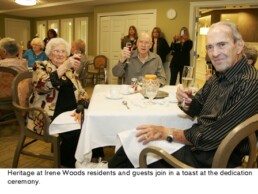An Ecumen Consultant’s Quest To Make Sense of Dementia
Tom Stober, an expert on process and efficiency, was routinely going about his work one day when he walked into a room and came face-to-face with something that “shook me to the core.” It was not logical. It was not rational. The normal rules of organization did not apply. On some deep level, it rocked his orderly world.
It was a memory care community, where residents with dementia live.
Tom works for Minnesota Lean Partners, which had been hired by Ecumen over a year ago to improve customer experiences by teaching staff how to focus on what is truly important—what really adds value— and eliminating unnecessary things that get in the way of that goal. This was his first consulting assignment in senior services. A mechanical engineer by training, Tom had worked for many manufacturing companies, most notably Toyota, where he first learned the principles of “lean” management from the masters.
The Ecumen training sessions Tom was conducting were going well. He was teaching, and he was learning. But that first exposure to memory care was life-changing for him.
“I had heard about Alzheimer’s and dementia,” he says, “but I was never truly exposed to the impact that this has on the residents as well as their families.”
After visiting the memory care community at Ecumen Detroit Lakes, Tom remembers going to his hotel room that night preoccupied with his experience. He just could not get it out of his mind. “I was troubled by the degree that this bothered me. I struggled with the fact that these crippling diseases destroy what was once functioning human beings as mothers, fathers, sisters and brothers.”
There was just no apparent logic to it.
Yet as Tom watched the caregivers at work, he was in awe of “how loving, caring and forgiving” they were— and how effective.
“I was amazed at the strength and caring of the Ecumen staff working in this environment day-in and day-out,” Tom recalls. “Being briefly exposed to some of the behaviors that Ecumen care providers experience daily, it had a sincere and profound impact on me. I have a much higher appreciation for their contributions to the organization and their dedication to providing a high quality care to those that truly need it.”
A powerful emotion swept over him. “What I saw made me more dedicated to the work Ecumen is doing and made me want to help the staff more,” he recalls.
“I know caregiving is a job I could not do,” Tom says. “It takes a certain type of person.”
But he realized he is the certain type of person who could make caregivers’ jobs easier. That could be his way of coming to terms and making a contribution.
From Tom’s point of view, you can always make things better with organization, standardization and elimination of useless and wasteful practices—whether in a manufacturing plant or a memory care community.
“This could be my small way of paying it forward,” he decided.
On the most basic level, he noticed right away that caregivers spent a lot of time just looking for things they needed, often going in and out of rooms several times looking for supplies and equipment. So he helped staff systematically figure out how to put all the tools of care in the same place in every room. With everything they need easy to find, they are freed up to spend more time in direct care.
Then he started digging deeper. How can we organize care around the biorhythms of the residents? When is the best time of day to have activities? How can space best be used to optimize residents’ enjoyment? How can we improve the residents’ environment and create better experiences? Recently, he worked with the memory care staff at Ecumen Pathstone Living in Mankato, Minn., to completely revamp the memory care community. Go to Ecumen’s Changing Aging blog to read about this effort.
Over the past year and a half, Tom has trained more than 1,000 Ecumen employees in “lean” principles and has run more than 40 events to analyze situations and implement continuous improvements. And his work continues— not only in creating better practices but also sustaining them.
As Tom was working with Ecumen and coming to grips with his reaction to observing dementia firsthand, his personal story took another turn. Tom learned that his own father is now in the early stages of dementia.
The lean management expert bonded with the dementia experts at Ecumen.
“I have gained so much knowledge about dementia,” Tom says. “The Ecumen nurses have really helped me better understand what is happening with my father, and how it’s happening and the progression to expect moving forward.”
And the paying it forward continues.
—
Ecumen received a Performance-based Incentive Payment Program (PIPP) award from the Minnesota Department of Human Services beginning October 1, 2011 - September 30, 2015. LEAN the Ecumen Way is a company-wide initiative to improve the way Ecumen delivers services in day-to-day operations. LEAN focuses on eliminating non-value added activities in our work— “wastes,” which get in the way of the more important value-added activities that customers desire.
In addition to improving resident experiences by introducing LEAN management techniques, Ecumen has pledged to reduce antipsychotics among people with dementia and improve lives in all Ecumen nursing homes through its Awakenings program (see Ecumenawakenings.org). In 2010, Ecumen was awarded a three-year performance-based grant from the State of Minnesota’s Department of Human Services to expand its pilot Awakenings program to Ecumen’s 15 nursing homes. Such grants help organizations expand innovative, results-based initiatives. These homes serve more than 1,000 people, including some of society’s most challenging dementia cases. The Minneapolis Star Tribune recently profiled the Awakenings program.
Heritage at Irene Woods in Memphis Hosts Official Dedication
Heritage at Irene Woods, a new Ecumen-managed senior living community near Memphis, Tenn., hosted its official dedication ceremony January 10, 2014, welcoming about 100 local officials, business owners and health care professionals for tours and lunch.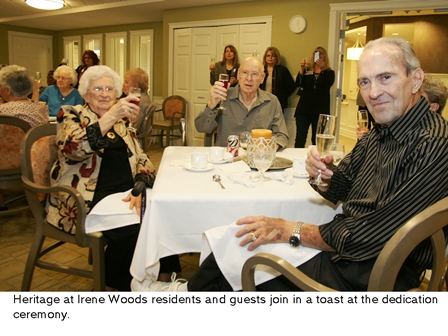
The dedication festivities included a program featuring Warren Rose, CEO of Edward Rose & Sons, the owner and developer of Heritage at Irene Woods and Julie Murray, Vice President of Sales, Marketing and New Business Development at Ecumen, along with local dignitaries.
Mark Luttrell, Mayor of Shelby County, sent a proclamation officially welcoming Heritage at Irene Woods to the community.
Heritage at Irene Woods recently opened with independent living, assisted living and memory care units. This is Ecumen’s first managed community in Tennessee and with partner Edward Rose & Sons, headquartered in Michigan. In the summer of 2014, Ecumen will begin managing another Edward Rose community in Clinton Township, Mich.
Heritage at Irene Woods provides 140 private apartments to people age 65+ all available on a monthly rental basis with no entrance fees. The community, totaling more than 165,000 square feet, has multiple common areas for the use of residents including three dining venues, a chapel, theater, pub, library, yoga/wellness center, salon and day spa, children’s area, Arboretum sun room, outdoor patios and garden areas. A team of licensed care staff are on-site 24-hours a day, for residents who need or require assistance.
The 150-acre Heritage campus, between Germantown and Collierville, will become a multi-generational neighborhood over the next five years that not only has a broad spectrum of senior living services, but also an adjacent multi-family apartment development sharing the amenities. The campus currently includes a three-story independent and assisted living building and a one-level memory care community with connected outdoor gardens and views overlooking Irene Woods.
For more information call 901-737-4735 or visit www.HeritageIreneWoods.com.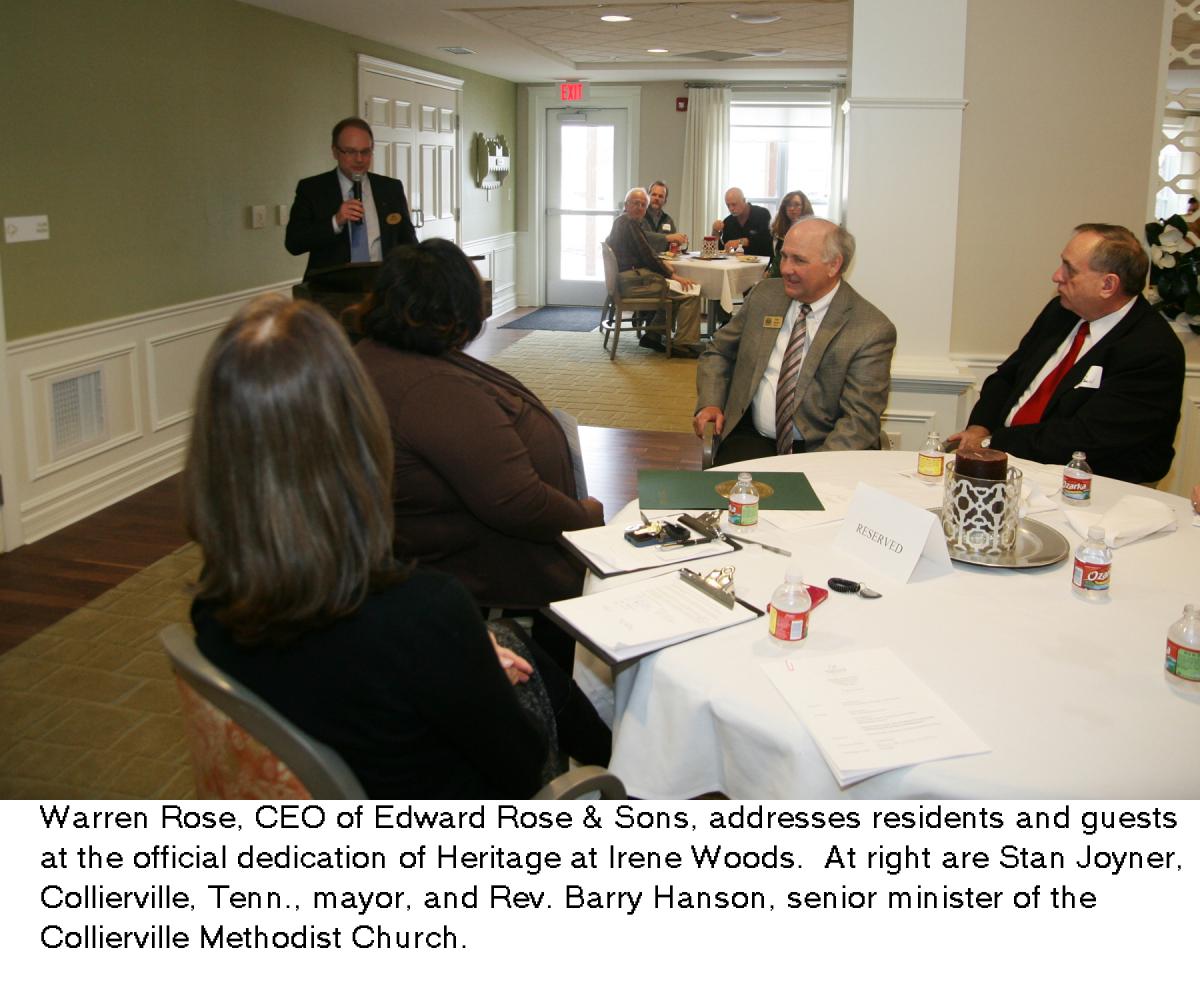
Revitalizing Memory Care at Ecumen Pathstone Living
The Memory Care team at Ecumen Pathstone Living recently decided it was time for a change. Inspired by a training video about state-of-the-art thinking on how to care for people with Alzheimer’s and other forms of dementia, they looked around the memory care unit and saw that something important was missing.
The 21-room facility, built in 2006, had a clean, elegant look. What it lacked was the ambiance of home. 
So for three days, the team did a complete review of the program, the residents’ individual interests and the physical setting. They set out to create a space where residents could directly engage with things that interest them in a space that feels like home.
The team cleaned, sorted and organized. They identified “themes” based on residents’ interests and analyzed the space for ways to improve engagement.
One thematic approach was to bring back the past, which can be very therapeutic for dementia patients. Now there is a “Reminiscence” area which will be changed out throughout the year to include things like seasonal décor, wedding dresses, farming, baseball, fur coats, jewelry, etc. Every article in the area is there for engagement--to be handled, tinkered with and enjoyed.
There is also an “Old Mankato” area with historic photos on display and a wall where residents have their own personalized baskets with items from home special to them. And in the “Nursery” area many residents like rocking and cradling dolls, which encourages the feeling of caring for others.
Another theme was to bring the outdoors inside with a “Garden/Sensory” area. In a sunroom near the front of the facility, flowers, lettuce, radishes, basil and parsley are now growing in raised-bed planters. In this area, residents can hear the sounds of rain drops, wind chimes, traffic and children playing.
Also, there is a “Nature/Relaxation” area with comfortable seating around a large fish tank and a “TV/Game/Music” area with a recreational theme, where families can gather.
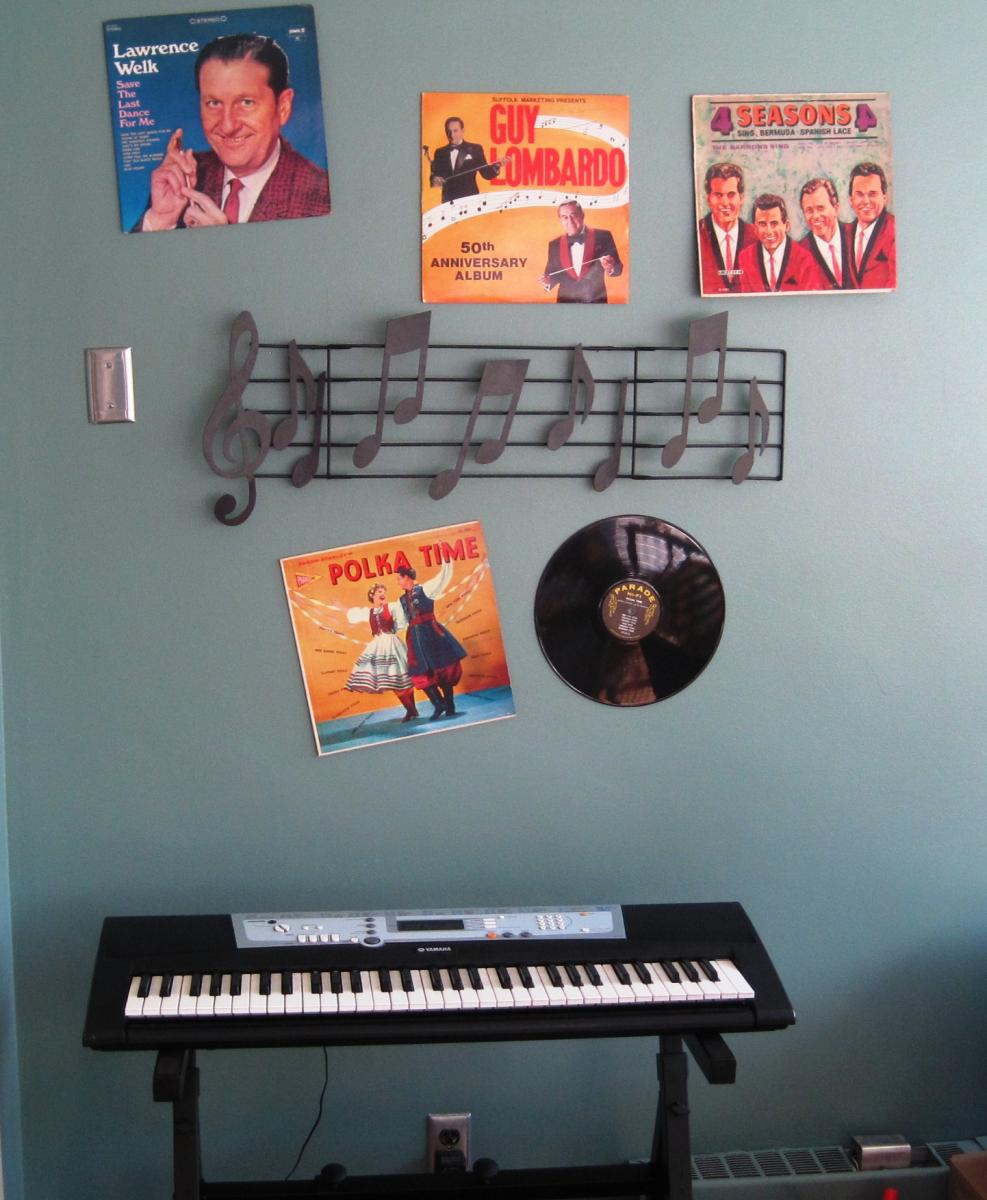 “There is a new energy around our neighborhood,” said Angela Stevens, RN, the assisted living manager. “Residents are much more engaged. Plus, this was a great experience for staff. We saw what a difference we could make in a short time just by looking at the situation differently. It has been very rewarding to see the results.”
“There is a new energy around our neighborhood,” said Angela Stevens, RN, the assisted living manager. “Residents are much more engaged. Plus, this was a great experience for staff. We saw what a difference we could make in a short time just by looking at the situation differently. It has been very rewarding to see the results.”
And family members agree. Lois Jaeger, whose mother lives at Ecumen Pathstone Living, sent this appreciative note:
“We miss them – our loved ones suffering from dementia or Alzheimer’s. No, they haven’t passed away, but so much of the essence of who they are is slipping away from us. How wonderful it is to have people and a program dedicated to drawing out bits and pieces of the ones we love so dearly.
“It has been exciting to learn about and watch as ‘Awakenings’ develops physically and programmatically at Pathstone Way. What fun to see the activity areas for gardening, costuming, ‘child’ care, etc. take shape. How gratifying to see the personal basket for my mother proudly displayed with evidence of who she really is. The ‘biography’ there, compiled by the staff from bits of information I supplied, is a lovely tribute to her and acknowledges the real person she has been and still is.
“But these tools would not mean as much as they do without the commitment and enthusiasm of the staff to utilize them. Residents are involved in projects that are designed to make them feel productive and contributing – just as they were before their illness. Smiles and laughter are coaxed out as sparks of humor and imagination are ignited by a costume or a picture. These things might seem small to others, but to those of us who love to see reflections of the person we remember they are enormous.
“My mother is surrounded by a staff that not only cares for her physical welfare but also understands and appreciates that locked inside a failing memory there is a history of a life spent in loving and giving. I am so thankful!”
Heritage at Irene Woods, an Ecumen-Managed Community, Rolls Out Its New Approach to Senior Living Near Memphis
Heritage at Irene Woods near Memphis, Tenn., recently welcomed its first independent-living residents and the assisted living and memory care units will open October 1. The senior living community, located at Forest Hill Irene Road and Bill Morris Parkway near I-385, is in the first phase of a long-term development plan that includes multi-family housing.
“This is the only senior living community of its kind in this area-- offering exceptional value and a completely new and different approach,” said Charlotte Curtis, marketing manager for the development. “These apartment homes are definitely larger and less costly than many of the other newer communities near here. Plus, we are in a beautiful setting in an ideal location, with superior services and amenities. No detail has been overlooked.”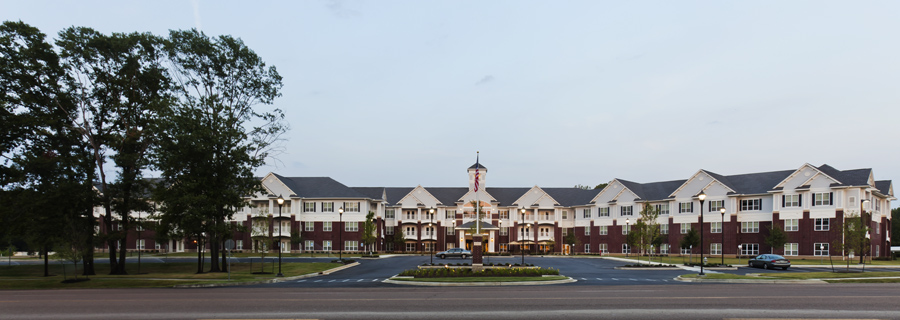
This is Ecumen’s first managed community in Tennessee and with partner Edward Rose & Sons, headquartered in Michigan. In the summer of 2014, Ecumen will begin managing another Edward Rose community in Clinton Township, Mich.
The 150-acre Heritage campus, between Germantown and Collierville, will become a multi-generational neighborhood over the next five years that not only has a broad spectrum of senior living services but also an adjacent multi-family apartment development sharing the amenities. “This will be a community for all ages,” Charlotte said. “It will truly fulfill Ecumen’s belief that growing older, no matter what the age or phase, is all about living. Residents will have the freedom, choice and flexibility to enjoy the way of life they love with all the familiar comforts and traditions and the opportunity to pursue new experiences and connections.”
The Heritage community is in a rural setting with small-town ambiance with towering live oak trees, deep woods and fields, yet is only minutes away from retail services, restaurants, shopping, Memphis International Airport, places of worship, golf courses and hospitals and clinics.
The campus includes a three-story independent and assisted living building and a one-level memory care community with connected outdoor gardens and views overlooking Irene Woods. The entire community totals over 165,000 square feet and offer 140 units of senior living apartments,all available on a monthly rental basis with no entrance fees.
“As residents’ needs change,” Charlotte said, “they will have access to all the benefits of a complete retirement community lifestyle, yet pay only for what they need, when they need it.”
Among the amenities at Heritage are three dining venues, concierge services, an arboretum, library and media room, club lounge and game room, on-site bank, general store, barber/beauty shop and spa, fitness and wellness studio, movie theater and chapel, outdoor courtyards, patios and walking paths, and indoor gardening.
For a tour or more information contact Charlotte Curtis at (901) 318-3886 or CharlotteCurtis@ecumen.org or visit www.HeritageIreneWoods.com


